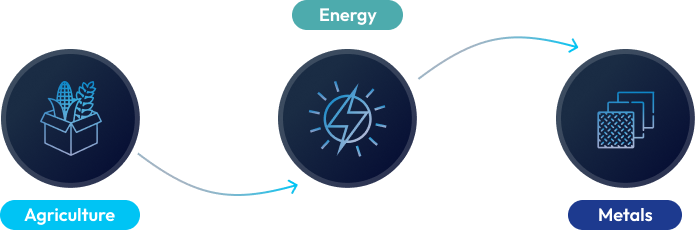Trading Opportunities
Trading Opportunities
3A.Stock Market:
-
What is the stock market?
The stock market is a place where buying and selling of shares takes place. These shares are issued in the primary market and then traded in the stock market. It helps a company to raise capital or fund for their business and also provides an opportunity for the investor to be a part of it and receive capital gain on the same.
● Initial Public Offer:
An IPO is an offering where the company issues its shares to the public for the first time. The offering is only issued once the company meets all the requirements to be listed on the exchange. The price band of the shares is generally decided as per the book building process and are available for subscription for the public. The shares are then allotted based on the bids received and then the stock is listed on the exchange at a predetermined date after the allotment.
Saudi Aramco, one of the world's largest companies, raised $29.4 billion in 2019 to become the largest global IPO till date.
-
Why to trade in US and Europe markets:
● Size and liquidity:
US and Europe markets are very large and highly liquid markets compared to other markets. This is because there are a lot of participants or investors engaging in buying and selling of securities.
●Regulation:
Both markets have well-established, robust and reliable regulatory framework for financial markets. This protects the interests of investors and also ensures transparency in performance, diligent compliance and reporting of companies.
● Political situation:
Stable socio-economic and political conditions prevailing in these markets, attract more investors on account of low market volatility.
● Strong macroeconomic factors:
As per market capitalization, the world’s largest stock exchanges are the NYSE (New York Stock Exchange) at 22.7 trillion dollars and NASDAQ (National Association of Securities Dealers Automated Quotation System) at 16.24 trillion dollars. Europe has two exchanges that are in the top ten global exchanges. One of them being Euronext with a market capitalization of 5.36 trillion euros and it combines the markets of Amsterdam, Lisbon, Paris, Oslo and Dublin. With a 51.12 Billion dollar market capitalization, London Stock Exchange (LSE) is the second largest and the oldest exchanges of the world. GDP (2021) of 20.19 trillion dollars for the US and 16.6 trillion dollars for Europe, translates to large business output that creates great market opportunities.
-
Equities:
Equities are shares of a company purchased by the shareholder to own some part of the company, have voting rights and have a part in the profit of the company limited to the number of shares owned. The shareholders can benefit from the corporate actions such as participating in the rights issue, bonus issue and dividends.
Corporate actions:

●Bonus Issue:
Bonus shares are the additional shares issued by the company when they intend to share part of their profits to the existing shareholders.
● Rights Issue:
Rights issue is a way of raising capital for the already listed companies. It gives preference to the company’s existing shareholders to purchase shares at a predetermined rate than the market rate. The shareholder can choose whether they want to participate in the rights issue.
● Dividends:
Dividends are distribution of the company’s earnings to its shareholders in the form of cash. This dividend is decided by the Board of Directors of the company and it can be issued at a different payout rate in a different time interval.
● Stock Splits:
A stock split is done when the company decides to split the existing shares into multiple shares increasing the total outstanding shares.The face value of the shares also get reduced in the same ratio.
For example: Tesla approved a stock split of 3:1 during their annual meeting in August 2022. The price of the Tesla stock got adjusted from $900 to $300 after the ex-dividend date. -
Indices:
Indices are a combination of stocks put together as a portfolio to replicate the performance of the market segments. This makes them a safer investment than investing in a single stock. The world’s most traded indices are S&P 500, DJI, FTSE 100 etc.
US 30 delivered a stellar return of 100% in a year after COVID-19 crash.
● Methods to construct Index:
❖ Capitalization weighted index:
In a capitalization weighted index such as S&P 500, more weightage is given to stocks with higher market capitalization. The market capitalization of a company is calculated by multiplying the number of outstanding shares of the company by the share price.
❖ Price weighted index:
In a price weighted index, more weightage is given to stocks with higher prices. One of the best examples of such an index is DJIA (Dow Jones Industrial Average).
❖Equal weighted index:
This type of index gives equal weightage to all the stocks regardless of market capitalization. Some examples are Guggenheim S&P 500 Equal Weight ETF, Russell 1000 Equal Weight Index, the NASDAQ-100 Equal Weighted Index, and the MSCI USA Equal Weighted Index.
3B.Forex:
-
What is Forex trading:
Forex trading is an activity of trading one currency against the other. It is one of the most liquid and highly traded markets as currency rates impact trade between countries, commodities and the financial markets.
Swiss Franc soared 30%, soon after Switzerland’s decision to scrap its currency peg of 1.20 to Euro in January 2015.
-
Categories of currency pairs:
●Major pairs:
Major currency pairs are the currencies that are paired with USD. These pairs are the most traded and hence the liquidity is really high. The spreads for these pairs are also very low due to high volume. Example: EUR/USD, USD/CHF.
● Minor pairs:
Minor currency pairs are a combination of any two currencies except USD. These pairs are more volatile than the major pairs and have higher spreads comparatively. Example: GBP/JPY, EUR/GBP.
●Exotic pairs:
Exotic pairs consist of one major currency and another less traded currency of a developing country. These pairs have very low volume and are rarely traded. Example: USD/SEK, EUR/MXN.
-
Specifications of Currency pairs:
● Base Currency:
The base currency is the first currency in the quotation. When a currency is bought it is expected that the base currency would rise and vice-versa for the sell position.
● Quote Currency:
The quote currency is the second currency in the quotation. When the currency is bought it is expected that the quoted currency will fall and vice-versa for the sell position.
●Pip:
A pip stands for price interest point in trading is the smallest movement that the currency pair can make. The pip size for forex is 0.0001.
● Lot size:
Lot size refers to the quantity of an instrument that can be purchased on the exchange. In forex, one standard lot size consists of 100,000 units.
● Bid/ask price:
Bid price is the price at which a buyer is ready to buy a certain quantity of the currency pair and ask price is the price at which the seller is ready to sell a certain quantity of the currency pair.
● Spread:
Spread is the difference between bid and ask price. The spread is affected by factors such as liquidity and volume of the pair.
● Swap:
Swap is the interest rate earned or paid on a position that is held overnight. There are two types of swap: Long swap and Short swap. Long swaps are applicable for buy trades and short swaps for sell trades.
3C.Commodities:
-
What is commodity trading?
Commodities trading involves trading agricultural, metal and energy commodities in the form of CFDs and derivatives. It is also used as a hedge against people who own physical assets of these commodities.
-
Types of Commodities:
● Agriculture:
This consists of commodities that are a source of raw material produced by agricultural activities such as cotton, corn, wheat, coffee, etc.
●Metals:
This consists of precious metals that are used to make jewelry such as gold, silver and other metals such as copper and aluminum.
● Energy:
These commodities are used for transportation and electricity such as crude oil, natural gas, gasoline etc.

-
Factors that affect the commodity market:
● Supply and demand:
As the supply and demand of commodities keep fluctuating it will affect the price of the commodity. If the demand for a commodity rises it will lead to an increase in price and when the supply rises, it will lead to a decrease in the price.
● Natural Disasters:
Various natural disasters such as hurricanes and earthquakes can affect the supply of commodities and cause shortages.
●Storage:
Storage of different commodities is also challenging. For example: Oil is stored in tankers, pipelines and carriers. In case of a fire explosion, it will affect the price of the commodity due to supply constraints.
● Seasonality:
The supply and demand of commodities changes as per seasons and affects the price. For example: Wheat prices usually start declining close to summer but rise during October and November due to the winter season.
● Geopolitics:
Commodities are supplied from various places around the world and when there is a political issue in a country it affects the supply and demand. For example: During the Russia-Ukraine crisis oil prices soared up to $120 per barrel.

-
Specifications of Commodity contracts:
● Pip:
A pip stands for price interest point in trading is the smallest movement that the currency pair can make.
● Lot size:
Lot size refers to the quantity of an instrument that can be purchased on the exchange.The lot size varies from one commodity to another.
● Spread:
Spread is the difference between bid and ask price. The spread is affected by factors such as liquidity and volume of the pair.
● Swap:
Swap is the interest rate earned or paid on a position that is held overnight. There are two types of swap: Long swap and Short swap. Long swaps are applicable for buy trades and short swaps for sell trades.
FAQ
Got some questions? We're here to help!
Join us for the Gateway to Wealth Copy Trading Tutorial

You're being redirected to another page, it may takes upto 3 seconds
